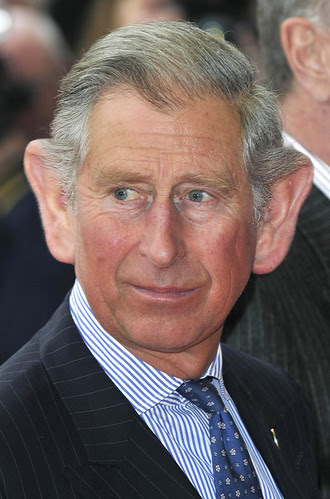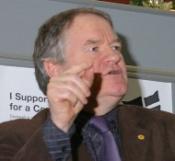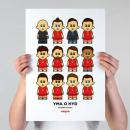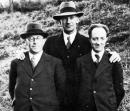Mae gen i ffrind bach yn byw ym Muckingham Palas,
A Charlo Windsor yw ei enw ef.
Tro dwethaf es i gnocio ar ei ddrws ei dy,
Daeth ei Fam i'r drws a medde hi wrthof i...
O, Carlo, Carlo,
Carlo'n 'warae polo heddi, heddi
Carlo, Carlo,
Carlo'n 'warae polo gyda Dadi, Dadi
Ymunwch yn y gân, trigolion fawr a man
O'r diwedd mae gynon ni 'Brins' yn ngwlad y gân.
Fe gafodd ei addysg draw yng ngwlad Awstralia,
Ac yna lan i Scotland yr aeth o.
Colofn y diwylliant Cymraeg,
Cyfrannwr i Dafod y Ddraig,
Aelod o'r Urdd, gwersyllwr er cyn cof...
O, Carlo, Carlo,
Carlo'n 'warae polo heddi, heddi
Carlo, Carlo,
Carlo'n 'warae polo gyda Dadi, Dadi
Ymunwch yn y gân, trigolion fawr a man
O'r diwedd mae gynon ni 'Brins' yn ngwlad y gân.
Bob wythnos mae e'n darllen Y Cymro a'r Faner,
Yn darllen Dafydd ap Gwilym yn ei wely bob nos,
Mae dyfodol y wlad a'r iaith yn agos at ei galon fach ef,
Y mae'n fwy o genedlaetholwr na'r FWA...
O, Carlo, Carlo,
Carlo'n 'warae polo heddi, heddi
Carlo, Carlo,
Carlo'n 'warae polo gyda Dadi, Dadi
Ymunwch yn y gân, trigolion fawr a man
O'r diwedd mae gynon ni 'Brins' yn ngwlad y gân.
O ie, Carlo, Carlo,
Carlo'n 'warae polo heddi ie, heddi
Carlo, Carlo,
Carlo'n 'warae polo gyda Dadi ie, Dadi
Ymunwch yn y gân, daiogion fawr a man
O'r diwedd mae gynon ni 'Brins' yn ngwlad y gân.
A Charlo Windsor yw ei enw ef.
Tro dwethaf es i gnocio ar ei ddrws ei dy,
Daeth ei Fam i'r drws a medde hi wrthof i...
O, Carlo, Carlo,
Carlo'n 'warae polo heddi, heddi
Carlo, Carlo,
Carlo'n 'warae polo gyda Dadi, Dadi
Ymunwch yn y gân, trigolion fawr a man
O'r diwedd mae gynon ni 'Brins' yn ngwlad y gân.
Fe gafodd ei addysg draw yng ngwlad Awstralia,
Ac yna lan i Scotland yr aeth o.
Colofn y diwylliant Cymraeg,
Cyfrannwr i Dafod y Ddraig,
Aelod o'r Urdd, gwersyllwr er cyn cof...
O, Carlo, Carlo,
Carlo'n 'warae polo heddi, heddi
Carlo, Carlo,
Carlo'n 'warae polo gyda Dadi, Dadi
Ymunwch yn y gân, trigolion fawr a man
O'r diwedd mae gynon ni 'Brins' yn ngwlad y gân.
Bob wythnos mae e'n darllen Y Cymro a'r Faner,
Yn darllen Dafydd ap Gwilym yn ei wely bob nos,
Mae dyfodol y wlad a'r iaith yn agos at ei galon fach ef,
Y mae'n fwy o genedlaetholwr na'r FWA...
O, Carlo, Carlo,
Carlo'n 'warae polo heddi, heddi
Carlo, Carlo,
Carlo'n 'warae polo gyda Dadi, Dadi
Ymunwch yn y gân, trigolion fawr a man
O'r diwedd mae gynon ni 'Brins' yn ngwlad y gân.
O ie, Carlo, Carlo,
Carlo'n 'warae polo heddi ie, heddi
Carlo, Carlo,
Carlo'n 'warae polo gyda Dadi ie, Dadi
Ymunwch yn y gân, daiogion fawr a man
O'r diwedd mae gynon ni 'Brins' yn ngwlad y gân.
Contributed by Riccardo Venturi - 2023/5/8 - 13:08
Language: English
English translation / Traduzione inglese / Traduction anglaise / Englanninkielinen käännös:
L-œuf (L.Trans.)

L-œuf (L.Trans.)

Carlo
I have a little friend who lives in Buckingham Palace, [1]
And Carlo Windsor is his name.
Last time I went to knock on his door,
His Mother came to the door and she said to me...
O, Carlo, Carlo,
Carlo's playing polo today, today,
Carlo, Carlo,
Carlo's playing polo with Daddy, Daddy.
Join in the song, people old and young [2]
Finally we have a prince in the land of song.
He received his education over in Australia,
And off to Scotland did he go. [3]
Columnist of Welsh culture,
Contributor to 'Tafod y Ddraig' [4]
A member of the Urdd [5], a camper ever since I can remember...
O, Carlo, Carlo,
Carlo's playing polo today, today,
Carlo, Carlo,
Carlo's playing polo with Daddy, Daddy.
Join in the song, people big and small,
Finally we have a prince in the land of song.
Every week he reads 'Y Cymro' and 'Y Faner', [6]
He reads Dafydd ap Gwilym [7] in his bed every night,
The future of the language and country is close to his heart,
He's a greater nationalist than the FWA... [8]
O, Carlo, Carlo,
Carlo's playing polo today, today,
Carlo, Carlo,
Carlo's playing polo with Daddy, Daddy.
Join in the song, peoples large and small,
Finally we have a prince in the land of song.
Oh yeah, Carlo, Carlo,
Carlo's playing polo today yeah, today,
Carlo, Carlo,
Carlo's playing polo with Daddy yeah, Daddy.
Join in the song, peoples large and small
Finally we have a prince in the land of song.
I have a little friend who lives in Buckingham Palace, [1]
And Carlo Windsor is his name.
Last time I went to knock on his door,
His Mother came to the door and she said to me...
O, Carlo, Carlo,
Carlo's playing polo today, today,
Carlo, Carlo,
Carlo's playing polo with Daddy, Daddy.
Join in the song, people old and young [2]
Finally we have a prince in the land of song.
He received his education over in Australia,
And off to Scotland did he go. [3]
Columnist of Welsh culture,
Contributor to 'Tafod y Ddraig' [4]
A member of the Urdd [5], a camper ever since I can remember...
O, Carlo, Carlo,
Carlo's playing polo today, today,
Carlo, Carlo,
Carlo's playing polo with Daddy, Daddy.
Join in the song, people big and small,
Finally we have a prince in the land of song.
Every week he reads 'Y Cymro' and 'Y Faner', [6]
He reads Dafydd ap Gwilym [7] in his bed every night,
The future of the language and country is close to his heart,
He's a greater nationalist than the FWA... [8]
O, Carlo, Carlo,
Carlo's playing polo today, today,
Carlo, Carlo,
Carlo's playing polo with Daddy, Daddy.
Join in the song, peoples large and small,
Finally we have a prince in the land of song.
Oh yeah, Carlo, Carlo,
Carlo's playing polo today yeah, today,
Carlo, Carlo,
Carlo's playing polo with Daddy yeah, Daddy.
Join in the song, peoples large and small
Finally we have a prince in the land of song.
Original Notes
[1] Welsh consonants sometimes change for grammatical reasons, thus "in Buckingham" ("yn Buckingham") becomes "ym Muckingham". However, this is rarely done with non-Welsh words, so this may have been an intentional pun on "muck" by Iwan.
[2] "Old and young" may convey the meaning better, but the Welsh lyric is literally: "big and small inhabitants".
[3] Scotland is typically "yr Alban" in Welsh, but Iwan uses "Scotland" here.
[4] Tafod y Ddraig (The Dragon's Tongue) is the magazine of Cymdeithas yr Iaith (The Welsh language society) who campaign for support of the Welsh language and people's right to use it. It was published monthly at the time this song was released.
[5] Urdd is a large voluntary youth organisation which runs events, activates, centres, and camps which are run in the medium of Welsh.
[6] Y Cymro (The Welshman) and Y Faner (The Flag) were weekly Welsh-language national newspapers which ran until 2018 and 1993 respectively. The modern equivalent is probably Golwg (View), a weekly current affairs magazine and news website. Y Cymro currently exists as a monthly newspaper.
[7] Dafydd Ap Gwilym is a noteworthy poet of the 14th century.
[8] The Free Wales Army were a group who supported Welsh Independence in the 1960s.
[1] Welsh consonants sometimes change for grammatical reasons, thus "in Buckingham" ("yn Buckingham") becomes "ym Muckingham". However, this is rarely done with non-Welsh words, so this may have been an intentional pun on "muck" by Iwan.
[2] "Old and young" may convey the meaning better, but the Welsh lyric is literally: "big and small inhabitants".
[3] Scotland is typically "yr Alban" in Welsh, but Iwan uses "Scotland" here.
[4] Tafod y Ddraig (The Dragon's Tongue) is the magazine of Cymdeithas yr Iaith (The Welsh language society) who campaign for support of the Welsh language and people's right to use it. It was published monthly at the time this song was released.
[5] Urdd is a large voluntary youth organisation which runs events, activates, centres, and camps which are run in the medium of Welsh.
[6] Y Cymro (The Welshman) and Y Faner (The Flag) were weekly Welsh-language national newspapers which ran until 2018 and 1993 respectively. The modern equivalent is probably Golwg (View), a weekly current affairs magazine and news website. Y Cymro currently exists as a monthly newspaper.
[7] Dafydd Ap Gwilym is a noteworthy poet of the 14th century.
[8] The Free Wales Army were a group who supported Welsh Independence in the 1960s.
Contributed by Riccardo Venturi - 2023/5/8 - 13:34
×
![]()
Note for non-Italian users: Sorry, though the interface of this website is translated into English, most commentaries and biographies are in Italian and/or in other languages like French, German, Spanish, Russian etc.







Testo e musica / Lyrics and music / Paroles et musique / Sanat ja sävel: Dafydd Iwan
Album / Albumi: Y caneuon cynnar
un'autentica Tazza dell'Incoronazione, portatagli appositamente da Londra.
Questa canzoncina in lingua gallese (dovuta all’irriverente Dafydd Iwan, l’autore di Yma o hyd, il “secondo inno nazionale” del Galles e sicuramente della nazionale di calcio gallese) ha qualche annetto: cinquantaquattro per la precisione, essendo stata composta nel 1969. E’ dedicata a un signore, tale Charles Philip Arthur George Windsor, che all’epoca era già più noto come “Carlo d’Inghilterra” in quanto “erede al trono” già da anni sufficienti affinché un neonato diventasse adolescente. In quanto “erede al trono” della Corona Britannica, gli spettava il titolo di “Principe di Galles”; titolo che avrebbe mantenuto fino all’8 settembre 2022, quando sua madre, la Regina Elisabetta II, si decise finalmente a tirare il calzino dopo aver passato settant’anni e 214 giorni dei suoi novantasei e rotti anni a regnare (cioè, in linea di massima, a non fare assolutamente una sega). Ne consegue che Carlo, nato il 14 novembre 1948, ha passato i medesimi settant’anni a fare il Principe di Galles (cioè, in linea di massima, a non fare la medesima sega, ma oramai disperando di salire al trono perché si riteneva che Elisabetta fosse immortale, oppure che resistesse proprio per non passare lo scettro a suo figlio). E invece no: anche per la monarchia britannica è arrivato l’8 settembre. Gli è toccato cambiare il titolo dell’inno nazionale e le effigi sulle sterline, ed il qui presente si è ritrovato pure la borsa del tabacco obsoleta (in quanto, assieme alle cartine e ai filtri, vi custodisco gelosamente una sterlina con l’immagine di Elisabetta II e una moneta da 25 pesos argentini del 1979, temendo che prima o poi mi si scateni nella borsa una guerra delle Falkland). E poi è arrivato il 6 maggio 2023, giorno dell’Incoronazione Ufficiale: finalmente Carlo d’Inghilterra, principe di Galles da record, è diventato il sig. Carlo Terzo.
La vecchia canzoncina gallese di Dafydd Iwan, talmente vecchia che risale all’ultimo anno in cui la Fiorentina ha vinto lo scudetto, all’anno in cui l’òmo sbarcò sulla Luna e pure all’anno in cui saltò in aria la Banca Nazionale dell’Agricoltura e un anarchico volò dalla finestra della Questura di Milano , ha bisogno di una piccola premessa. Si dirà forse qualcuno: “Ma come, una canzone in gallese, il regno delle doppie vù dove “cuculo” si dice “cwcw”, ha un titolo in italiano…?” Nossignore: il titolo è in gallese stretto, con tanto di “mutazione aspirata”, laddove necessaria, in “Charlo” come richiesto dalle lingue celtiche. Solo che “Carlo”, in gallese, ha un uso un po’ particolare e specializzato: è, in assoluto, il nome più comune dato dai gallesi ai loro amici a quattro zampe, altresì detti cani. Corrisponde, insomma, al nostro “Fido” Uso talmente comune, che lo ho constatato persino nel mio Teach Yourself Living Welsh: nelle mostruose “conversazioni” a corredo delle singole lezioni (basate sulle noiosissime vicende di vita quotidiana di una “famiglia tipica” gallese -dall'ovvio nome di Jones), il cane di famiglia si chiama proprio Carlo (per la cronaca, è un cocker: cane che, per la vastità delle sue orecchie, si adatta benissimo al sovrano). Per farla breve: all’allora Principe di Galles viene riservato il nome di un cane, e non è male come inizio. La canzone, per il resto, è una garbata presa per il cülo dell’erede al trono (e anche di sua madre): vi si immagina che Carlo, che naturalmente gioca a polo, sia talmente preso dal suo principato gallese da non pensare ad altro (come no!), diventando addirittura più nazionalista dei nazionalisti più sfegatati. Oddio, a pensarci bene, a volte il nazionalismo dei gallesi ha qualche sbavatura: ad esempio, uno dei primi provvedimenti della famiglia Tudor, di pura stirpe gallese, fu praticamente quello di abolire la lingua gallese, imponendo l’esclusivo uso ufficiale dell’inglese. Tant’è: questa ironica canzoncina giunge comunque a pipa di cocco a due giorni dall’Incor(o)nazione, senza mai dimenticare quella celebre frase dovuta, si pensi un po’, a un inglese: “Siamo nati per marciare sulla testa dei re”. Anche se, nel caso di Carlo Terzo, si marcerebbe piuttosto sugli orecchi. [RV]